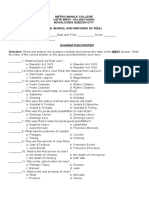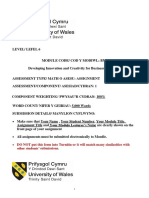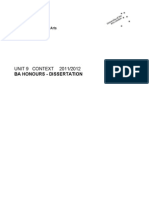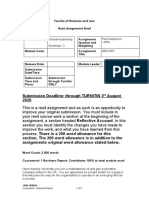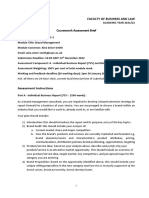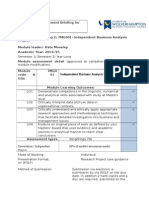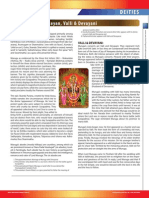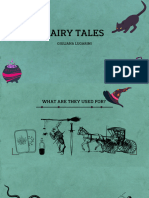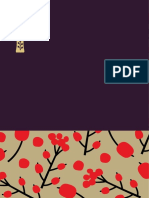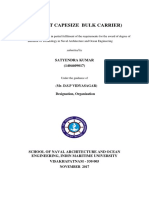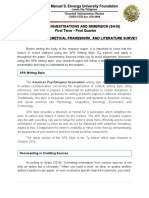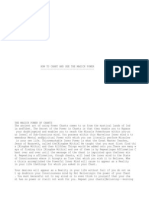Assessment Brief CreativeProvect2023-24
Assessment Brief CreativeProvect2023-24
Uploaded by
Piotr SordylCopyright:
Available Formats
Assessment Brief CreativeProvect2023-24
Assessment Brief CreativeProvect2023-24
Uploaded by
Piotr SordylCopyright
Available Formats
Share this document
Did you find this document useful?
Is this content inappropriate?
Copyright:
Available Formats
Assessment Brief CreativeProvect2023-24
Assessment Brief CreativeProvect2023-24
Uploaded by
Piotr SordylCopyright:
Available Formats
College of Arts, Technology and Environment
ACADEMIC YEAR 2022/23
Assessment Brief
Submission and feedback dates
Submission deadline: Before 14:00 on Friday 26th April and at presentation during
on Tuesday 12th December
It is eligible for a 48-hour late submission window
Marks and Feedback due: 20 working days after the late submission window.
Submission details
Module title and code: Creative Project UPNN6N-30-3
Component and type: Component A (presentation) / Component B (portfolio)
creative work and reflective essay
Assessment title: Creative Project
Assessment weighting: Component A 25% of total module mark Component B 75% of
the total module mark
Size or length of the written assessment: 9500 words plus ten-minute presentation
In line with UWE Bristol’s Assessment Content Limit Policy (formerly the Word Count Policy),
word count comprises all text, including (but not limited to): the main body of text
(including headings), all citations (both in and out of brackets), text boxes, tables and
graphs, figures and diagrams, quotes, lists.
Module learning outcomes assessed by this task:
1. On successful completion of this module students should be able to:
Project-manage their own work, showing an ability to work independently, set goals,
manage workloads and meet deadlines.
2. Demonstrate originality, creative ambition, imaginative flair, and attention to detail
in the content and creative approach of their project.
3. Produce clear, accurate, artistically coherent and technically sophisticated written
work, which articulates a combination of research (where appropriate) and creative
ideas.
4. Show mature awareness of context, genre and audience.
5. Show mature awareness of the potential social and/or commercial effects of their
work.
6. Show an ability to reflect on their work (in terms of both process and product) in a
constructive and insightful manner.
Marks and Feedback
Your assessment will be marked according to the following marking criteria:
Component A, presentation:
Live presentation (5mins) followed by a supplementary Q and A (max 5 mins). At this
presentation you should explore the aims and objectives of your project, its current
state of development and what you’d like to achieve with it. You will have an
opportunity to explore your aims and objectives through supplementary questions.
Marking criteria for presentations
Content – 25%
You will be marked on your capacity to exemplify your idea with relevant content
exploring the thematic and conceptual aspects of your script as well technical issues
like style, setting, characters, plot and story. Your content should evidence a
confident grasp of the subject matter and offer a memorable insight into your work.
Structure – 25%
You will be marked on your approach to the structuring of your story and to your
ability to structure this presentation.
Clarity – 25%
The clarity of your presentation will be assessed. To help get your ideas across, you
may use visual aids, prompt cards etc. but these are not essential. Your capacity to
characterise your story requires an understanding of its value.
Relevance – 25%
Your story’s context is important – your personal relationship with it is important.
Similarly, its context in the market is important, key influences and genres are
relevant. It’s worth also considering the audience – who are they and why now?
Component B: creative work and reflective essay
Creative component: markers will pay particular attention to these attributes of your
creative work:
• The overall presentation, structure and professional appearance of the work.
• Its originality, creative ambition, imaginative flair, and attention to detail in the
content and creative approach of their project.
• Ther competence, clarity, accuracy and artistic coherence of the written work
• Awareness of context, genre and audience.
Reflective essay, markers will pay particular attention to these attributes of your reflective
work:
• Technical and compositional issues
• The development of the work
• How reading has influenced or guided your writing, from ideas to techniques
• The challenges you faced and how you responded to them as you wrote successive
drafts
• Redrafting and editing process
• The influence of your supervisor and readers
• The wider creative and critical context
• What you have learnt along the way about the writing process and yourself as a
writer
Completing your assessment
What am I required to do on this assessment?
Many creative writing assessments are composed of two elements – a work of fiction and
reflection about writing that work of fiction. Different modules may deviate from this
format, but, as a rule, you’ll find this approach behind all the presentations and other
packages you’re asked to put together.
The key to success in this module is planning. To succeed in the presentation before
Christmas, you need to understand what your project is about and have discussed the
project with your supervisor. This discussion and your decision making during the first term
can be used as evidence of your project’s development during the presentation.
By the beginning of term 2 successful students will have a first draft of their creative piece
which they can develop, using formative feedback with their tutors during the term. By the
end of the term, successful students will have ideated, researched, written and edited an
original creative work and they will be in a position write an illuminating reflective essay
exploring the important aspects of the project.
Where should I start?
Ensure that you have checked Blackboard for details of when the assignment briefing
and/or consultations will take place. Staff will give detailed advice about how to prepare for
this assignment, both in class and in Blackboard materials and/or recordings.
What do I need to do to pass?
You must ensure that you have carefully followed the assignment rubric (see Blackboard)
and consulted the module handbook, whilst fulfilling the learning outcomes stated above.
Additionally, see Blackboard for a document outlining the overall marking criteria and grade
boundaries for UWE’s English Literature / English Literature with Writing programmes.
How do I achieve high marks in this assessment?
The hallmarks of first-class and 2:1 submissions are outlined in the overall marking criteria
document on Blackboard. You should aim for an extremely high standard in key areas, such
as: response to the question or brief; argument; knowledge of primary texts; independent
thought; engagement with research; critical analysis; referencing; written expression.
How does the learning and teaching relate to the assessment?
Teaching sessions will equip you to critically analyse the specific texts and/or topics covered
in your assignment. Additionally, all teaching across the module will give you a broader
understanding of widers themes, contexts, and concepts. Teaching throughout the module
will also build vital skills for the assessment, which may include technical close reading of
literature and/or critical application of secondary research materials.
What additional resources may help me complete this assessment?
See the Blackboard page for all relevant resources, including:
Details of scheduled assignment briefings and/or consultations;
Specific assignment information and guidance;
Overall assignment documents for your degree programme, including writing skills
and referencing guidance, marking criteria, submission checklist, and resit advice.
A reading list of secondary sources, as a starting point for your research;
Links to the UWE Study Skills website and other key materials.
What do I do if I am concerned about completing this assessment?
UWE Bristol offers a range of Assessment Support Options that you can explore through this
link, and both Academic Support and Wellbeing Support are available.
For further information, please see the Academic Survival Guide.
How do I avoid an Assessment Offence on this module?
Use the support above if you feel unable to submit your own work for this module.
UWE Bristol’s UWE’s Assessment Offences Policy requires that you submit work that is
entirely your own and reflects your own learning, so it is important to:
Ensure you reference all sources used, using the MLA system. Guidance is
available on UWE’s Study Skills referencing pages.
Avoid copying and pasting any work into this assessment, including your own
previous assessments, work from other students or internet sources.
Avoid copying sentences from sources and changing individual words.
Develop your own style, arguments and wording.
Never give your work to others who may copy it.
In an individual assessment, develop your own work and preparation, and do
not allow anyone to make amends on your work (including proof-readers,
who may highlight issues but not edit the work).
When submitting your work, you will be required to confirm that the work is your own,
and text-matching software and other methods are routinely used to check submissions
against other submissions to the university and internet sources. Details of what constitutes
plagiarism and how to avoid it can be found on UWE’s Study Skills pages about avoiding
plagiarism.
You might also like
- Midterm Exam in RizalDocument8 pagesMidterm Exam in RizalDan Gregorious100% (3)
- The Sea and The Bells - Pablo NerudaDocument136 pagesThe Sea and The Bells - Pablo Neruda007phantom100% (6)
- Roland Barthes' "Mourning Diary" and "The Preparation of The Novel" - New RepublicDocument15 pagesRoland Barthes' "Mourning Diary" and "The Preparation of The Novel" - New RepublicdlpjhuNo ratings yet
- Night AnalysisDocument4 pagesNight Analysismatifernandez2717% (12)
- CIPM HandbookDocument14 pagesCIPM HandbookdphotoportsmouthNo ratings yet
- Outline 1 SamuelDocument3 pagesOutline 1 Samuelapi-262108572No ratings yet
- Ravenloft The Complete Book of Witches and Warlock 1Document120 pagesRavenloft The Complete Book of Witches and Warlock 1J Paul Borrero100% (1)
- Spiritual Enlightenment Thoughts by Param Shradhey Shri Jaydayalji Goyandka-Sethji in EnglishDocument4 pagesSpiritual Enlightenment Thoughts by Param Shradhey Shri Jaydayalji Goyandka-Sethji in Englishheynaath100% (1)
- James 4.5 and The Jealous SpiritDocument18 pagesJames 4.5 and The Jealous SpiritJohnny Hanna0% (1)
- MKT302 UFM Assignment Details - Sept 2021 SemesterDocument9 pagesMKT302 UFM Assignment Details - Sept 2021 SemesterKhắc PhongNo ratings yet
- Student Guidelines For Capstone CompletionDocument23 pagesStudent Guidelines For Capstone Completionjenpaler_117No ratings yet
- Socw (1876) - 1Document5 pagesSocw (1876) - 1Austin GomesNo ratings yet
- PG Assessment Brief and Assessment Criteria (BMO0116 22-23)Document7 pagesPG Assessment Brief and Assessment Criteria (BMO0116 22-23)Harsh SandhuNo ratings yet
- Uadapp 15 3 Ppwe Gd3 Modulehandbook2023Document6 pagesUadapp 15 3 Ppwe Gd3 Modulehandbook2023Ha WalkNo ratings yet
- B-Dc204 Practical Studio 2B: //design Thinking and PracticeDocument16 pagesB-Dc204 Practical Studio 2B: //design Thinking and Practiceanived0110No ratings yet
- MSC Project Handbook 2021 - 2022Document14 pagesMSC Project Handbook 2021 - 2022M SaleemNo ratings yet
- LD7015 Advanced Practice London Research ProjectDocument8 pagesLD7015 Advanced Practice London Research Projectxavaya3519No ratings yet
- FMP BriefDocument5 pagesFMP Briefapi-531036599No ratings yet
- GA36b Level 5 Assessment Specification Template Business 2023 24Document9 pagesGA36b Level 5 Assessment Specification Template Business 2023 24paulourena627No ratings yet
- Individual Assignment Itb Aug 2022 Question & RubricDocument6 pagesIndividual Assignment Itb Aug 2022 Question & RubricjaydenNo ratings yet
- Assessment Brief BMSW6102 - Developing Innovation and Creativity For Business Advantage PDFDocument8 pagesAssessment Brief BMSW6102 - Developing Innovation and Creativity For Business Advantage PDFahsan labidNo ratings yet
- cp3m Yeovil Module Handbook 2012Document8 pagescp3m Yeovil Module Handbook 2012api-33630204No ratings yet
- Edct400fall2014 ProjectoutlinesDocument14 pagesEdct400fall2014 Projectoutlinesapi-235703207No ratings yet
- 5th Assignment-6th MayDocument5 pages5th Assignment-6th May021-Shah Vaiz AshfaqNo ratings yet
- Schumann Eng2010 f18 Syl 608Document8 pagesSchumann Eng2010 f18 Syl 608api-235849253No ratings yet
- AIC Project Brief 2022-23Document11 pagesAIC Project Brief 2022-23Vishnu ArvindNo ratings yet
- Assignment Brief and Guide - Group Presentation 2Document8 pagesAssignment Brief and Guide - Group Presentation 2Ramona CristinaNo ratings yet
- ARU BA2 L6 Contemporary Management Issues Part 1Document6 pagesARU BA2 L6 Contemporary Management Issues Part 1Mizanur RahmanNo ratings yet
- Unit 9 Context 2011/2012: Ba Honours - DissertationDocument16 pagesUnit 9 Context 2011/2012: Ba Honours - DissertationsmithmccaulskyNo ratings yet
- Faculty of Business and LawDocument8 pagesFaculty of Business and LawBatool HamzaNo ratings yet
- UMADBK Assignment Brief (CW2)Document9 pagesUMADBK Assignment Brief (CW2)Mutuma RaphaelNo ratings yet
- COMP1682 Handbook 2022-23Document26 pagesCOMP1682 Handbook 2022-23mw5nthdyx2No ratings yet
- BM631 CW1 Assignment Brief 2023-24Document9 pagesBM631 CW1 Assignment Brief 2023-24ben.micliucNo ratings yet
- Assessment Brief L5 FDW 22-23Document7 pagesAssessment Brief L5 FDW 22-23faraaz360No ratings yet
- Assignment Brief Academic Year 2019-20: ReferencingDocument5 pagesAssignment Brief Academic Year 2019-20: ReferencinggeofreyNo ratings yet
- Level 7assessment SpecificationDocument12 pagesLevel 7assessment SpecificationZia RaoNo ratings yet
- MAR042 6+Assignment+1+Brief+2022Document4 pagesMAR042 6+Assignment+1+Brief+2022ramanpreet kaurNo ratings yet
- Unit 9 Context 2011/2012: Ba Honours - Work PlacementDocument24 pagesUnit 9 Context 2011/2012: Ba Honours - Work PlacementsmithmccaulskyNo ratings yet
- BA Hons in Art & Design YR 1: 2021-22: Negotiated ProjectDocument11 pagesBA Hons in Art & Design YR 1: 2021-22: Negotiated ProjectEmma WrightNo ratings yet
- Assessment Brief 1 - Individual ProjectDocument15 pagesAssessment Brief 1 - Individual Projectroyporna198No ratings yet
- Tij Design OutlineDocument4 pagesTij Design Outlineapi-294575329No ratings yet
- LD7083 - Dissertation - TaggedDocument9 pagesLD7083 - Dissertation - TaggedGayatri BalayagariNo ratings yet
- 00 Ist626 Syllabus Summer 2015Document8 pages00 Ist626 Syllabus Summer 2015api-263640960No ratings yet
- Assignment 4 (WC2)Document9 pagesAssignment 4 (WC2)黃峰No ratings yet
- Project FinDocument4 pagesProject FinPlatonic IsomorphNo ratings yet
- Resit - 302BSS - Global Leadership Assn - 2019 - 20Document7 pagesResit - 302BSS - Global Leadership Assn - 2019 - 20Royford Wanyoike wamaithaNo ratings yet
- 7BUS2055-0105 Assessment Brief, CW2CDocument3 pages7BUS2055-0105 Assessment Brief, CW2Crajchatterjee06No ratings yet
- Thesis Proposal PPT FormatDocument7 pagesThesis Proposal PPT Formatafkodpexy100% (2)
- Brand Management Assignment Brief 2022-10-14 10 - 47 - 01Document7 pagesBrand Management Assignment Brief 2022-10-14 10 - 47 - 01norimomo 911No ratings yet
- Level 7assessment SpecificationDocument16 pagesLevel 7assessment Specificationzia raoNo ratings yet
- EDP 618 (Fall 2018)Document13 pagesEDP 618 (Fall 2018)Tiêu NghiêmNo ratings yet
- BUS9045 Assessment 2 Briefing 2024Document5 pagesBUS9045 Assessment 2 Briefing 2024talhamazari100No ratings yet
- E1 Portfolio 3 WorkshopDocument7 pagesE1 Portfolio 3 WorkshopSapun SomarathnaNo ratings yet
- AFM500 Capstone Coursework April 2023Document7 pagesAFM500 Capstone Coursework April 2023kamaus620No ratings yet
- LD7201 CW2-Research Proposal NU Assessment Brief Sept 2023V5.09.23Document10 pagesLD7201 CW2-Research Proposal NU Assessment Brief Sept 2023V5.09.23khadijawhasNo ratings yet
- D3151 Assessment Details (Updated 27.11.2018)Document4 pagesD3151 Assessment Details (Updated 27.11.2018)GibbyboxNo ratings yet
- EGC Assignment2 Brief-Jan2021Document6 pagesEGC Assignment2 Brief-Jan2021Hussein MubasshirNo ratings yet
- IIBM7002 Entrep Ass 2Document9 pagesIIBM7002 Entrep Ass 2AnujanNo ratings yet
- Umcdmt-15-1 Portfolio Assessment BriefDocument7 pagesUmcdmt-15-1 Portfolio Assessment BriefAnoofa AhmedNo ratings yet
- Unit 1 AssignmentDocument4 pagesUnit 1 AssignmentSaiman Haq BadhonNo ratings yet
- BE750-Assignment Specification-2021Document6 pagesBE750-Assignment Specification-2021Maryam LatifNo ratings yet
- Assessment Brief 2022-2023Document7 pagesAssessment Brief 2022-2023sidraNo ratings yet
- What Is A Capst-WPS OfficeDocument8 pagesWhat Is A Capst-WPS OfficeAngelica AguilarNo ratings yet
- Pubafrs 6075Document7 pagesPubafrs 6075Jared EvansNo ratings yet
- IIBM7002 Entrep Ass 1Document9 pagesIIBM7002 Entrep Ass 1AnujanNo ratings yet
- Guidelines For Preparation and Presentation of Project Report CMR College of Engineering & TechnologyDocument15 pagesGuidelines For Preparation and Presentation of Project Report CMR College of Engineering & TechnologyTelika RamuNo ratings yet
- 7MG001 Dissertation Assessment Briefing 2014-2015Document10 pages7MG001 Dissertation Assessment Briefing 2014-2015Samik DuttaNo ratings yet
- The Ultimate Thesis Companion A Step-by-Step Guide to Writing Research Papers, Theses, and Dissertations with Confidence: Guide How To Write MBA ThesisFrom EverandThe Ultimate Thesis Companion A Step-by-Step Guide to Writing Research Papers, Theses, and Dissertations with Confidence: Guide How To Write MBA ThesisNo ratings yet
- Ayedawbon Soe Pp. 44-70Document27 pagesAyedawbon Soe Pp. 44-70Aung Aung HlaingNo ratings yet
- Dissertation A Quasi-Experimental Study of InterventionDocument92 pagesDissertation A Quasi-Experimental Study of InterventionMerwinNo ratings yet
- Ralph McInerny (Auth.) Studies in Analogy 1968Document145 pagesRalph McInerny (Auth.) Studies in Analogy 1968elsuplantadorNo ratings yet
- Murugan LordDocument1 pageMurugan Lordsagar29No ratings yet
- Bhakti Sastri SlokasDocument52 pagesBhakti Sastri SlokasNimai Pandita Raja Dasa100% (1)
- Byron and OrientalismDocument30 pagesByron and OrientalismPavel AlekseevNo ratings yet
- Maya Angelou Autobiography: Singin' and Swingin' and Gettin' Merry Like Christmas Is The Third Book ofDocument4 pagesMaya Angelou Autobiography: Singin' and Swingin' and Gettin' Merry Like Christmas Is The Third Book ofEvelinaNo ratings yet
- Read Around TheDocument5 pagesRead Around TheCorina BranischiNo ratings yet
- Will The Real Saint Valentine Please Stand Up?Document2 pagesWill The Real Saint Valentine Please Stand Up?Diana Mariela Martinez YepezNo ratings yet
- Partaker of Divine NatureDocument2 pagesPartaker of Divine NatureElishaNo ratings yet
- The Things They CarriedDocument4 pagesThe Things They CarriedDerek LiuNo ratings yet
- Volsunga Saga Signy and SigurdDocument31 pagesVolsunga Saga Signy and SigurdEmma Lagasca - VillacortaNo ratings yet
- English Literary TextDocument12 pagesEnglish Literary TextKhen MiendoNo ratings yet
- Silk Road Class 11 Questions and Answers PDFDocument7 pagesSilk Road Class 11 Questions and Answers PDFtejpalsingh12No ratings yet
- Fairy TalesDocument22 pagesFairy TaleslugarinigiulianaNo ratings yet
- Gender: Places, Spaces and Thresholds, Ed. by Victoria Blud, Diane Heath and Einat Klafter (London: IHR, 2019) .Document271 pagesGender: Places, Spaces and Thresholds, Ed. by Victoria Blud, Diane Heath and Einat Klafter (London: IHR, 2019) .Daisy BlackNo ratings yet
- Lily StopDocument2 pagesLily StopLia KexniNo ratings yet
- 82000dwt Capesize Bulk CarrierDocument4 pages82000dwt Capesize Bulk CarrierSatyendra KumarNo ratings yet
- Literature by Raymond WilliamsDocument1 pageLiterature by Raymond Williamsrmudavath55No ratings yet
- Module 1 - Lesson 3 - PR3Document9 pagesModule 1 - Lesson 3 - PR3Cressia Mhay BaroteaNo ratings yet
- How To Chant and See The Power of MagickDocument2 pagesHow To Chant and See The Power of Magickamazingdivinegrace0% (1)
- Alexanderinindia00curt PDFDocument216 pagesAlexanderinindia00curt PDFGena Litvak100% (1)
